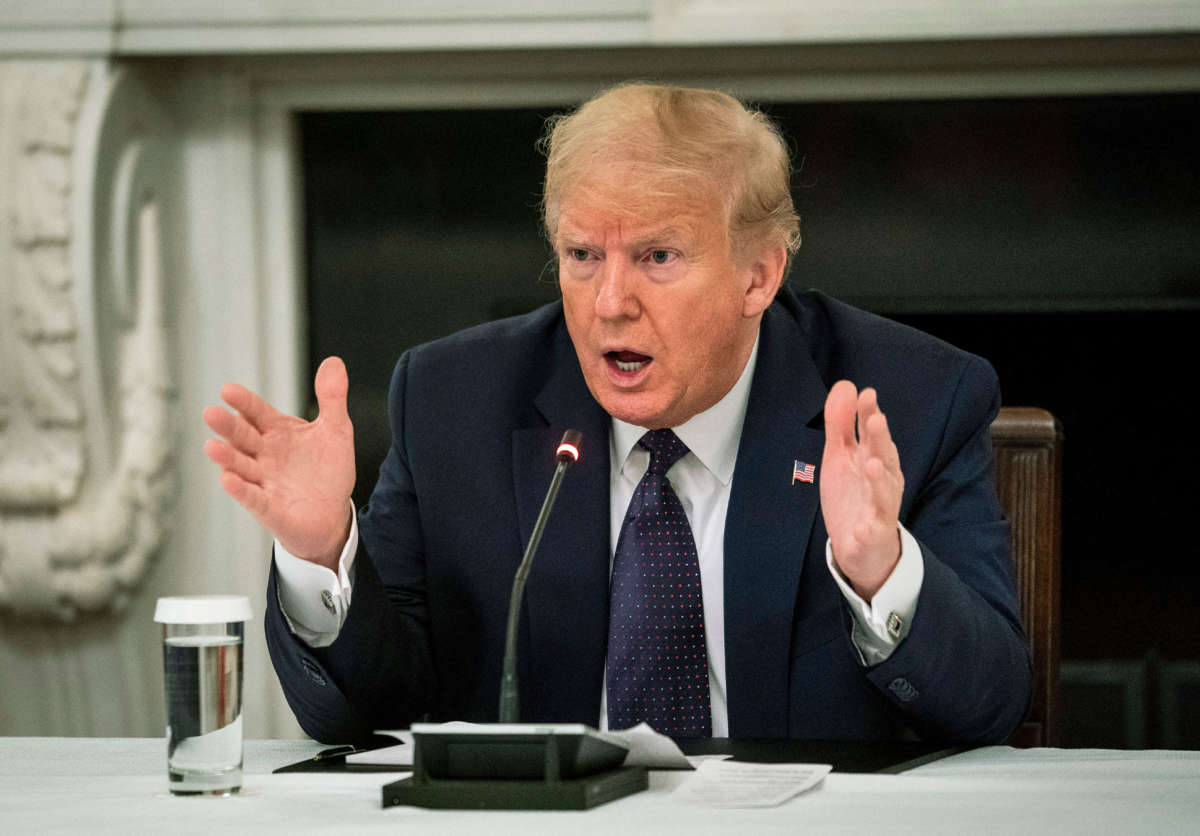President Donald Trump signed an executive order on Thursday regarding social media sites, in response to a fact-check he received from Twitter earlier this week, with hopes that his doing so will allow the reinterpretation of a law widely cited as crucial for the birth of the internet.
Trump issued an order that examines Section 230 of the Communications Decency Act of 1996, according to CNN, which obtained a draft copy of the executive order before it was officially signed. A key section of that law states that “No provider or user of an interactive computer service shall be treated as the publisher or speaker of any information provided by another information content provider.”
That set of words is often described as “the 26 words that created the internet,” and gives social media sites tremendous protections when it comes to content produced by users.
The law as it’s interpreted today says that companies earn those protections so long as they operate in “good faith” — that is, they act in ways that are arguably good or beneficial for the consumers. Trump’s order states that social media sites are not meeting that condition.
“In a country that has long cherished the freedom of expression, we cannot allow a limited number of online platforms to hand-pick the speech that Americans may access and convey online,” the draft of the order said. “This practice is fundamentally un-American and anti-democratic. When large, powerful social media companies censor opinions with which they disagree, they exercise a dangerous power.”
Speaking to reporters on Thursday, Trump explained that he no longer viewed social media sites as acting in a neutral way.
“Currently, social media giants like Twitter received unprecedented viability shield based on the theory that they are a neutral platform, which they are not. We are fed up with it. It is unfair, and it’s been very unfair,” Trump said.
According to CNN’s Jim Acosta, Trump also expressed a desire to close Twitter down for good, although he recognized he wouldn’t be able to do that.
“If it were legal, if it could be legally shut down, I would do it,” Trump said.
Trump also plans to accuse sites of “invoking inconsistent, irrational, and groundless justifications to censor or otherwise punish Americans’ speech here at home.”
The order represents the most aggressive response yet from the Trump administration toward social media sites. It will undoubtedly be challenged in courts, however on a number of fronts, including the possible argument that it would be an unfair regulation of social media sites’ First Amendment speech rights.
On Wednesday morning, Facebook co-founder and CEO Mark Zuckerberg was interviewed on Fox News to discuss his views on the matter — and appeared to agree with Trump on the matter.
“I believe strongly that Facebook shouldn’t be the arbiter of truth of everything that people say online,” Zuckerberg said. “I think in general, private companies shouldn’t be, especially these platform companies, shouldn’t be in the position of doing that.”
Perhaps in response to both Zuckerberg’s words and Trump’s executive order, Twitter CEO Jack Dorsey, citing the president’s words specifically, stood firm in his decision to issue fact checks on the president or other public figures.
“We’ll continue to point out incorrect or disputed information about elections globally. And we will admit to and own any mistakes we make,” Dorsey wrote in a series of tweets. “This does not make us an ‘arbiter of truth.’ Our intention is to connect the dots of conflicting statements and show the information in dispute so people can judge for themselves.”
Dorsey also explained that Trump’s tweets earlier in the week “may mislead people into thinking they don’t need to register to get a ballot,” thus warranting a fact-check to them.
The president on Tuesday had errantly and without evidence said that expanding the right of Americans to participate in elections using mail-in ballots would be rife with fraud — even though he himself has utilized absentee mail-in voting in the recent past, as have other members of his White House staff.
“There is NO WAY (ZERO!) that Mail-In Ballots will be anything less than substantially fraudulent,” Trump had written. “Mail boxes will be robbed, ballots will be forged & even illegally printed out & fraudulently signed.”
In response to Trump’s tweets, Twitter posted a small link at the bottom of them. “Get the facts about mail-in ballots,” the link said, transporting users to a page headlined, “Trump makes unsubstantiated claim that mail-in ballots will lead to voter fraud.”
Trump responded later in the day by accusing Twitter of “stifling FREE SPEECH,” and that he would “not allow it to happen.” On Wednesday, he promised to “regulate or close” sites that behaved this way in the future.
Join us in defending the truth before it’s too late
The future of independent journalism is uncertain, and the consequences of losing it are too grave to ignore. To ensure Truthout remains safe, strong, and free, we need to raise $33,000 in the next 2 days. Every dollar raised goes directly toward the costs of producing news you can trust.
Please give what you can — because by supporting us with a tax-deductible donation, you’re not just preserving a source of news, you’re helping to safeguard what’s left of our democracy.
